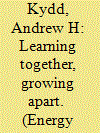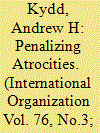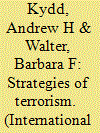|
|
|
Sort Order |
|
|
|
Items / Page
|
|
|
|
|
|
|
| Srl | Item |
| 1 |
ID:
096085


|
|
|
|
|
| Publication |
2010.
|
| Summary/Abstract |
Standard models of uncertainty in economics imply that sharing information can reduce uncertainty and help identify welfare improving policies. In international relations, "epistemic communities" of scientists are thought to help provide information for these purposes. However, conflicting preferences can frustrate the transmission of information and prevent effective information sharing. In addition, opportunities for information sharing can deepen distrust as actors observe each other's reaction to what to them is credible information. A model that assumes uncertainty both about the state of the world and the parties' motivations is applied to international climate change negotiations.
|
|
|
|
|
|
|
|
|
|
|
|
|
|
|
|
| 2 |
ID:
186593


|
|
|
|
|
| Summary/Abstract |
The Syrian Civil War that began in 2011 killed more than 400,000 civilians. Could a limited intervention motivated by humanitarian concerns have reduced the death toll at an acceptable cost to the intervenors? I distinguish between two approaches to intervention: penalizing atrocities, by raising the cost and lowering the benefit of killing civilians; and fostering a balance of power, to convince the two sides that they cannot win on the battlefield and so must negotiate an end to the war. I show, using a game-theoretic model, that fostering a balance of power causes the government to commit more atrocities and prolongs the war. Penalizing atrocities, while it increases the likelihood of war, can reduce the expected level of atrocities. The model helps account for the failure of US efforts to promote negotiations by aiding Syrian rebels, and the success of efforts to deter Syrian chemical weapons use through threats and limited strikes.
|
|
|
|
|
|
|
|
|
|
|
|
|
|
|
|
| 3 |
ID:
073825


|
|
|
|
|
| Publication |
2006.
|
| Summary/Abstract |
Terrorism is designed to change minds by destroying bodies; it is a form of costly signaling. Terrorists employ five primary strategies of costly signaling: attrition, intimidation, provocation, spoiling, and outbidding. The main targets of persuasion are the enemy and the population that the terrorists hope to represent or control. Terrorists wish to signal that they have the strength and will to impose costs on those who oppose them, and that the enemy and moderate groups on the terrorists' side cannot be trusted and should not be supported. Each strategy works well under certain conditions and poorly under others. State responses to one strategy may be inappropriate for other strategies. In some cases, however, terrorists are pursuing a combination of strategies, and the response must also work well against this combination.
|
|
|
|
|
|
|
|
|
|
|
|
|
|
|
|
| 4 |
ID:
168427


|
|
|
|
|
| Summary/Abstract |
Is the world better off with nuclear weapons or without? Nuclear pessimists point to the potentially devastating costs of a nuclear war. Nuclear optimists argue that nuclear weapons reduce the likelihood of war and are thus beneficial. This debate is inconclusive in part because it misses an important conceptual point. We should care both about the cost of war and the likelihood of war, as they combine to form the expected cost of war, which is the product of the two. I discuss five implications of focusing on expected costs. Three support the pessimists: (1) nuclear weapons raise the upper limit on how destructive wars can be; (2) there may be a floor on how low the likelihood of war can go; and (3) risk aversion over damage will raise the expected cost of nuclear war. The remaining two support the optimists: (4) strategic models exhibit a declining expected cost of war; and (5) casualty data show that the expected cost of war is declining over its observed range in the past two hundred years.
|
|
|
|
|
|
|
|
|
|
|
|
|
|
|
|
| 5 |
ID:
187556


|
|
|
|
|
| Summary/Abstract |
Mistrust is a common cause of conflict between individuals belonging to different identity groups. When can such mistrust be overcome? We present a theoretical model of trust-building across social identity groups to address this question. Trust between groups increases when individuals in one group are willing to take a chance on engaging with members of the other group, their engagement is positively reciprocated, and they are able to credibly communicate the experience to their fellow group members, thereby increasing their belief that members of the other group are trustworthy. This process is made easier if the individuals are not too hostile to the out-group, are flexible enough to change their beliefs in response to new information, and are sufficiently attached to their own group to be honest about their experiences with out-group members.
|
|
|
|
|
|
|
|
|
|
|
|
|
|
|
|
| 6 |
ID:
105994


|
|
|
|
|
| Publication |
2011.
|
| Summary/Abstract |
A key problem for counterterrorism is how large numbers of individuals can be screened most efficiently to discover terrorists. This question arises at security checkpoints of all kinds, from roadblocks to airline security counters. Some argue that certain categories of individuals, for instance, young Muslim men in the airline context, should be screened more heavily than others. Others deride this as racial profiling, and argue that any such scheme would be easily evaded. I examine a model of searching for terrorists among a population divided into categories that vary in their potential reliability or ease of recruitment as agents of terrorist attacks. The equilibria in the model feature profiling, in that different categories are searched with different intensities. Practical difficulties in implementing a rational profiling scheme are discussed.
|
|
|
|
|
|
|
|
|
|
|
|
|
|
|
|
| 7 |
ID:
151152


|
|
|
|
|
| Summary/Abstract |
Both threats and assurances can be useful in international negotiations. Threats help convince the adversary that a state will fight if challenged, and assurances can convince the adversary that a state will not attack if not challenged. We develop a model that analyzes when threats and assurances are used. Threats are widely useful because there is typically a range of outcomes that are preferable to war for each side, and threats can secure a better deal within that range by strengthening a state’s bottom line. In contrast, assurances are only necessary when war would result without them because of insufficiently valued intermediate outcomes or shifting power. We discuss insights from the model, including the role of false assurances, in the context of both the Sudetenland crisis and Cold War Europe.
|
|
|
|
|
|
|
|
|
|
|
|
|
|
|
|
| 8 |
ID:
065872


|
|
|
|
|
| Publication |
Princeton, Princeton University Press, 2005.
|
| Description |
xvi, 284p.
|
| Standard Number |
0691121702
|
|
|
|
|
|
|
|
|
|
|
|
Copies: C:1/I:0,R:0,Q:0
Circulation
| Accession# | Call# | Current Location | Status | Policy | Location |
| 050171 | 327.101/KYD 050171 | Main | On Shelf | General | |
|
|
|
|
| 9 |
ID:
074857


|
|
|
|
|
| Publication |
2006.
|
| Summary/Abstract |
Mediation is one of the most widespread techniques for preventing conflict and promoting cooperation. I examine the conditions under which mediators can facilitate cooperation by building trust between two parties. Assuming mediators have no intrinsic commitment to honesty, they can be credible trust builders in one-round interactions only if they care about the issue at stake, have a moderate ideal point, and do not find conflict to be too costly. A mediator that is solely interested in promoting cooperation, or one that is biased toward one side, will be ineffective. A desire to preserve a reputation for honesty can overcome a limited amount of bias or issue indifference.
|
|
|
|
|
|
|
|
|
|
|
|
|
|
|
|
|
|
|
|
|